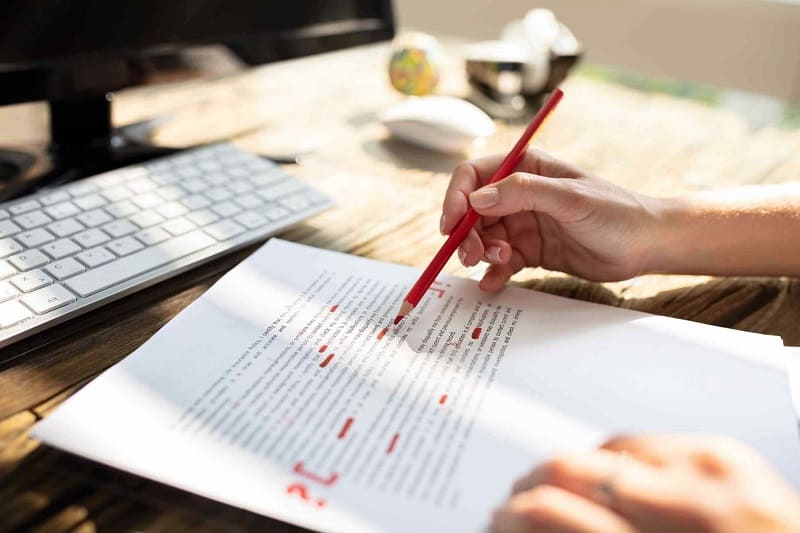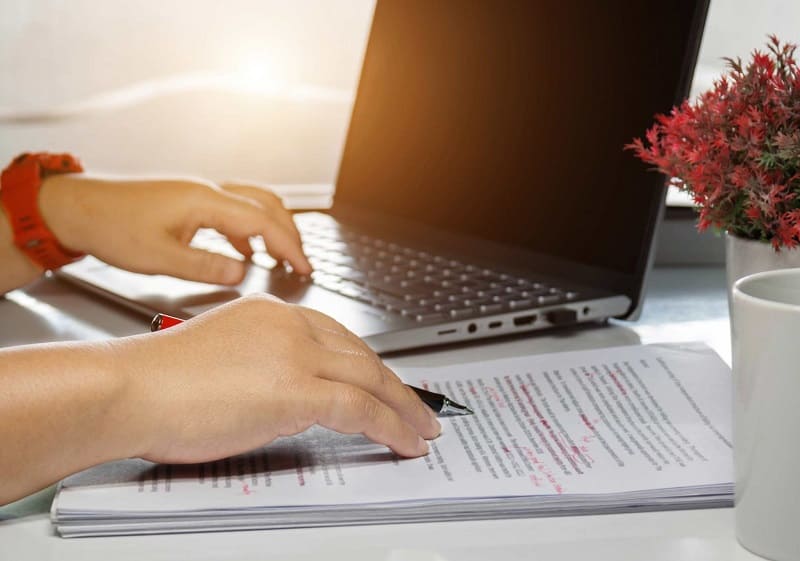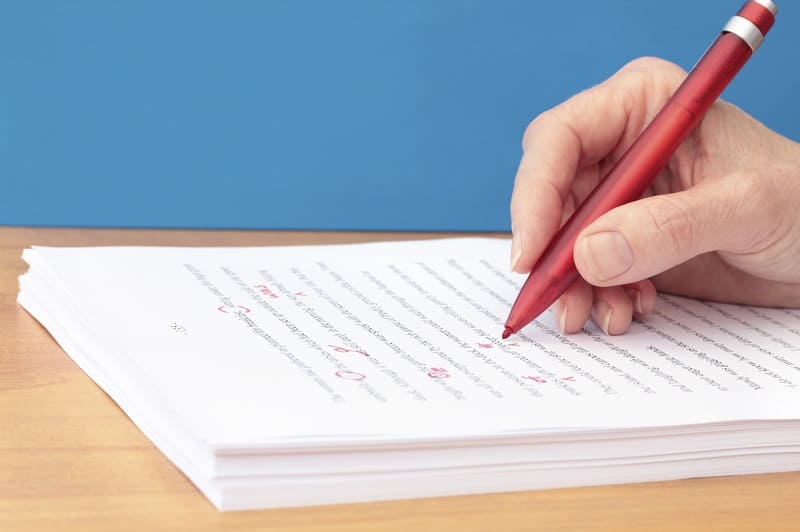Are you wondering how to write short horror stories? If so, then you’ve come to the right place for answers.
Do you have a knack for grammar and spelling? Are you able to detect errors in the text quickly and easily? If so, proofreading may be the perfect career for you!
Proofreaders play an essential role in the publishing process by ensuring that text is free of errors before it goes to print.
If you’re interested in learning more about this career, keep reading. We will discuss what proofreading is precisely and how to become a proofreader.
This blog covers the following topics:
- Who is proofreaders, and what do they do?
- Becoming a proofreader? Educational requirements.
- What skills do proofreaders need to have?
- Proofreading tips for beginners
- The benefits of becoming a proofreader
- Career opportunities for proofreaders, and how much do they make?
What is a Proofreader, and What Do They Do?
Proofreading is reviewing written material for grammar, punctuation, spelling, and style errors. The proofreading process ensures that the final product is accurate and high-quality.
Proofreaders check written materials for errors before they are published. This includes looking for typos, misspellings, and grammatical errors.
Although anyone can proofread their work, having another person do this is often helpful, as they may spot errors you have missed.
Proofreaders also check for style, clarity, fluency, and format consistency. In addition, they may mark up a copy of the text with corrections or make suggestions for changes.
To be a successful proofreader, it is important to have excellent attention to detail and be familiar with grammar and punctuation rules. Proofreading can be time-consuming, but it is essential to ensure accuracy and readability in publications.
How to Become a Proofreader?
There are many ways to become a proofreader online, but there are a few key steps everyone should follow.
First, it is vital to have a strong foundation in grammar and punctuation. Anyone who wants to be a proofreader should be able to identify errors in these areas quickly.
In addition, it is helpful to have experience with different style guides, such as the AP Stylebook or the Chicago Manual of Style. Familiarity with these guides will help proofreaders catch errors that might otherwise be missed.
Finally, it is essential to be able to work quickly and efficiently. Proofreaders need to be able to focus on small details and spot errors in a text.
With practice, anyone can develop the skills necessary to become a proofreader.

Educational Requirements for Proofreaders
While there are no formal educational requirements, most proofreaders have at least a bachelor’s degree. Employers often require prospective proofreaders to take a test to demonstrate competency.
Therefore, it is beneficial for proofreaders to hold a bachelor’s degree in English. Graduates from other disciplines can also be successful if they strongly understand written language.
Additionally, employers may also require applicants to have prior experience in proofreading. Those interested in becoming proofreaders can start by volunteering to proofread for local publications or taking an online course.
What Skills Or Traits Are Needed To Be A Successful Proofreader?
To be a successful proofreader, one needs to have the following:
1. Excellent grammar and spelling skills;
2. The ability to spot errors quickly;
3. Attention to detail;
4. Patience; and the ability to work independently.
In addition to the above points, a proofreader must have excellent attention to detail. They must spot even the most minor errors and have the patience to read through large amounts of text carefully.
A proofreader must also be able to communicate effectively with both authors and editors. They need to be able to explain why changes need to be made, and they should be able to do so in a respectful and constructive way.
If a proofreader possesses all these skills and traits, they will likely succeed in their or career.
How Can You Become A Proofreader If You Don’t Have Any Experience Or Training In The Field?
While experience and training are beneficial, they are optional for getting started in the field.
One of the best ways to learn to proofread is to start reading with a critical eye. As you read, pay attention to spelling, grammar, and punctuation errors, and think about how they could be corrected.
You can also search online for free proofreading courses or tutorials for a more formal introduction to this type of editing.
Proofreading Tips For Beginners
There are three main types of mistakes to look for: spelling, grammar, and punctuation
For beginners, there are three main types of mistakes to look for: spelling, grammar, and punctuation.
For grammar mistakes, it can be helpful to break each sentence down into its parts and examine each word and phrase. For example, looking at the verb tense or subject-verb agreement can help you identify errors.
Lastly, when it comes to punctuation, one pro tip is to always pause after each sentence to make sure that you have remembered all commas and full stops.
Read the text backward.
One of the most effective proofreading techniques is to read the text backward. This allows you to focus on each word without getting distracted by the sentence’s overall meaning.
Another helpful tip is to take a break after writing before beginning the proofreading process. This will help you approach the text with fresh eyes and catch errors you might otherwise overlook.
Read it out loud to catch errors that you might have missed
One of the best ways to catch errors in your writing is to read it aloud. This will help you hear any awkward phrasing or incorrect words and give you a sense of the overall flow of the piece.
Reading aloud can be especially helpful for catching run-on sentences or overuse of certain words. If you find yourself stumbling over a particular section, your readers will likely have the same experience. Take the time to revise any confusing or choppy passages, and your writing will be all the stronger for it.
By following these tips, you can catch more mistakes and improve the overall quality of your writing. So, remember to proofread your work for a few extra minutes next time you write something!

The Benefits of Becoming a Proofreader
Many people underestimate the importance of proofreading. In an age where we are bombarded with information from all sides, it is more important than ever to ensure that our written communications are clear and error-free.
As a proofreader, you can play a vital role in ensuring the accuracy of books, business correspondence, legal documents, marketing materials, and more. In addition to improving the quality of your writing, you can also help others to communicate more effectively.
In many cases, a single typo or grammatical error can change the meaning of a sentence entirely. As a proofreader, you can help prevent such mistakes from occurring and provide invaluable feedback that can improve the clarity of a text.
In today’s fast-paced world, communicating clearly and effectively is essential. As a proofreader, you can help to ensure that our written communications are up to par.
It’s a great way to make extra cash
For many people, proofreading is a great way to make extra money. It can be a very lucrative career, and it can also be very flexible.
Many companies hire proofreaders, and many of them allow you to work from home. This means you can set your hours and work as much or as little as you want.
Proofreading can also be a great way to improve your editing skills. If you’re interested in becoming better as a writer, this is one of the best ways to do it.
Where Can You Learn More About Proofreading And Improve Your Skills As A Proofreader?
While some people are born proofreading geniuses, the rest of us can still benefit from honing our skills. If you’re interested in becoming a better proofreader, a few different options are available.
One is to take a class, workshop, or course targeted explicitly at proofreading. These can be found both in-person and online, and they’ll give you a chance to learn the basics (or brush up on the basics if you’re already familiar with them) and practice your skills under the guidance of an experienced instructor.
In addition, these courses will allow you to learn about the different aspects of proofreading, including grammar, punctuation, and formatting. They will also allow you to practice your skills on real documents.
Alternatively, you could read one of the many books that have been written on the subject. This option is more self-directed, but it’s also usually cheaper than taking a class. Reading about proofreading can help you to understand the process better and learn about different techniques that you can use.
Finally, another option is to practice proofreading on your own. While this won’t give you structured instruction, it will allow you to develop your methods and tailor them to your preferences.
However, if you choose to improve your skills, with a bit of practice, you can become a master proofreader in no time.
Are There Career Opportunities For Proofreaders, And How Much Do They Make?
The career opportunities for proofreaders are expected to remain sound and grow in the coming years. This growth is partly due to the increasing use of technology, which has led to a need for skilled proofreaders who can spot errors in online content.
In addition, with the proliferation of online content, there is an increasing demand for proofreaders who certify that this content meets specific quality standards. As a result, those interested in becoming a proofreader can expect to find plenty of job opportunities in the coming years.
An hourly wage for a proofreader is typically between $20 and $30 per hour. The salary would be somewhere between $40,000 and $70,000 per year. Keep in mind that these are just estimated figures.
Some proofreaders make more than that, while others make less. However, earnings can vary depending on experience, employer, and other factors.

Getting Started as a Proofreader
There are a few different ways to get started as a proofreader. One option is to sign up with a company that provides proofreading services. These companies often have a website where you can submit your resume and work samples.
Another option is to freelance as a proofreader. This can be done by setting up a profile on a freelance platform. Once you have established yourself as a proofreader, you can start bidding on jobs. And, because this is a work-from-home job, you can set your hours and take on as many or as few jobs as you like.
Finally, start promoting your services! Let people know that you are available to proofread their writing projects. Once you get some experience under your belt, you’ll be well on your way to becoming a successful proofreader.
Conclusion
How to be a proofreader? Becoming a proofreader takes time and practice, but if you have the patience and skill set, it’s a career that can be very rewarding.
The best way to start learning is by taking an online course or finding someone to mentor you in proofreading. Once you have the basics down, make sure to practice regularly so that your skills stay sharp.
Whichever route you choose, hone your proofreading skills and always be on the lookout for mistakes!






